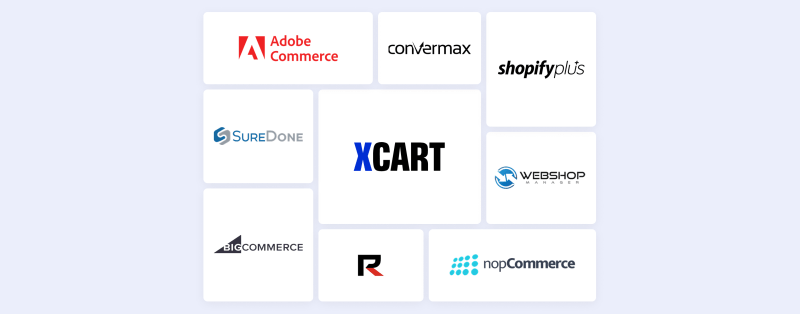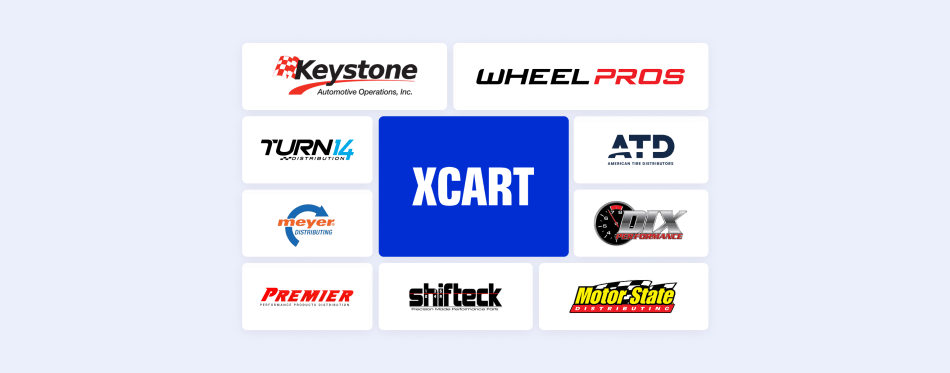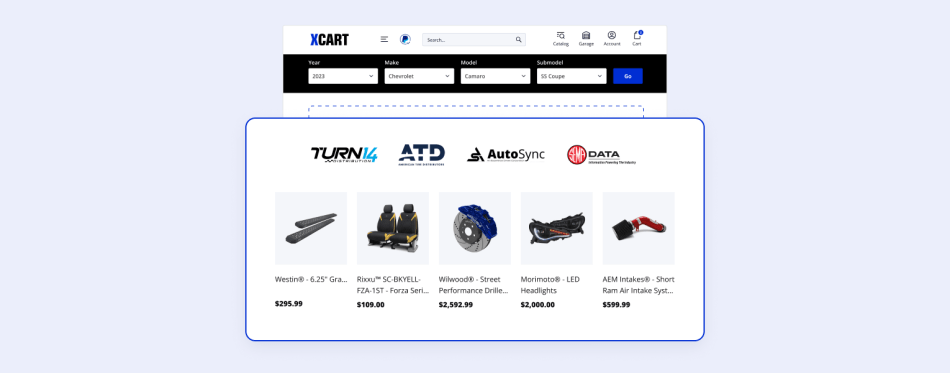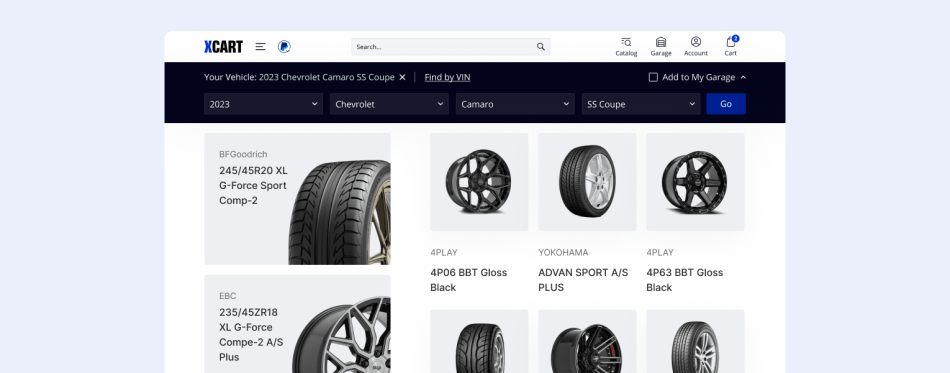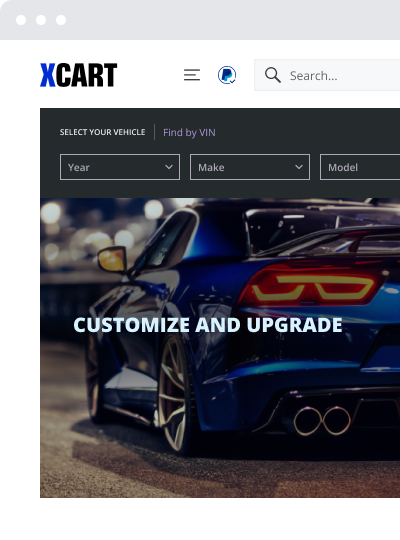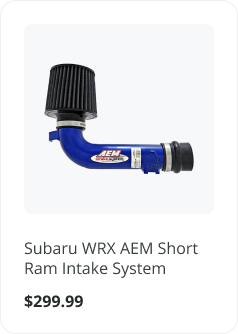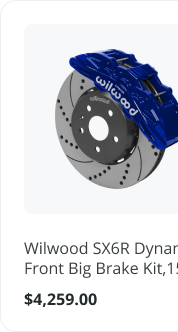Top 9 Automotive Website Providers for Auto Parts eCommerce
Published: September 4, 2023. Updated: February 6, 2025.
Choosing an auto parts eCommerce platform is very much like buying a new car – you must look into what lies under the hood to ensure it handles all the features and provides the required functionality.
In addition to an eye-catching, user-friendly interface, secure payment processing, automated product catalogs, and distributed order management, your eCommerce solution should be able to provide business growth opportunities without overspending on maintenance and upgrades.
In this article, we’ve compiled a rundown of the most popular automotive website providers, highlighting their benefits and spotting the weak points to aid you in your search for the best eCommerce platform for your auto parts online store.
What Defines an Ideal Auto Parts Website Builder
Finding an ideal website builder is easier said than done. You’ll need far more than just a platform with a storefront and checkout. Even a popular and robust shopping cart solution may not be the right choice unless it considers the nuances of the automotive industry and can be tailored to the specifics of a particular business.
Must-have eCommerce features for automotive online stores include:
- strong storefront tools (like product visualization, easy navigation, and advanced fitment search);
- mobile optimization;
- integrations with catalog providers and warehouse distributors;
- automated fitment data updates;
- simplified fulfillment and order management;
- secure payment gateways and shipping options;
- SEO and marketing tools;
- multi-channel selling;
- affordable customizations;
- reliable technical support.
Among all types of digital commerce platforms, an API-driven software application will be able to cover all these requirements long-term and ensure the balance between automotive specific features and flexibility. Even though they may take a bit longer to get up and running compared to SaaS, headless platforms are more powerful, feature-rich, and cost-efficient in the long run.
Top 9 Automotive eCommerce Platforms
We’ve analyzed nine major eCommerce platforms to back aftermarket online stores, including X-Cart, Shopify, and BigCommerce, focusing mainly on such factors as prebuilt automotive-specific features, affordable customizations, integrations with catalog providers and warehouse distributors, technical support, and retailers’ reviews.
You may perceive a hint of bias since you are reading this comparison on the X-Cart blog. We 100% love our solution and have seen its value through our clients’ experiences. However, we want to ensure the utmost impartiality by thoroughly researching features, toolkits, case studies, and customer reviews on competitor platforms. In the end, the decision is yours, based on the features, industry, and budget that align with your needs.
A Quick Overview of the Main Features
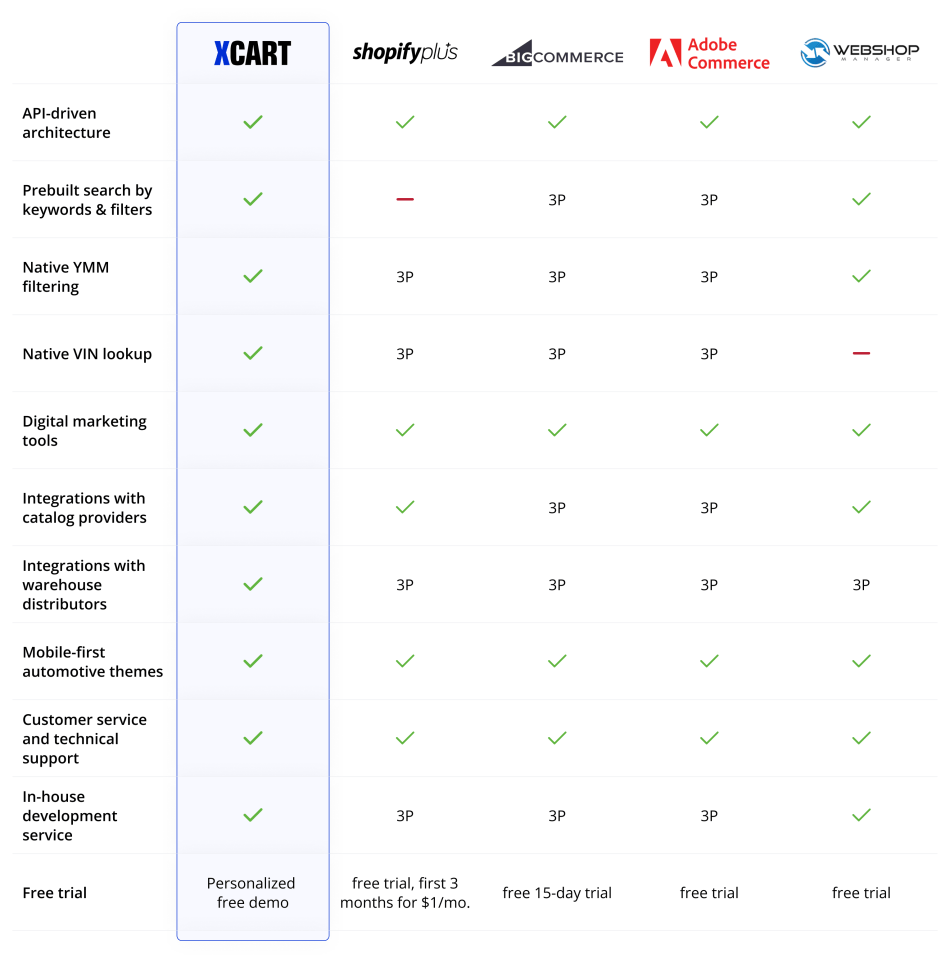
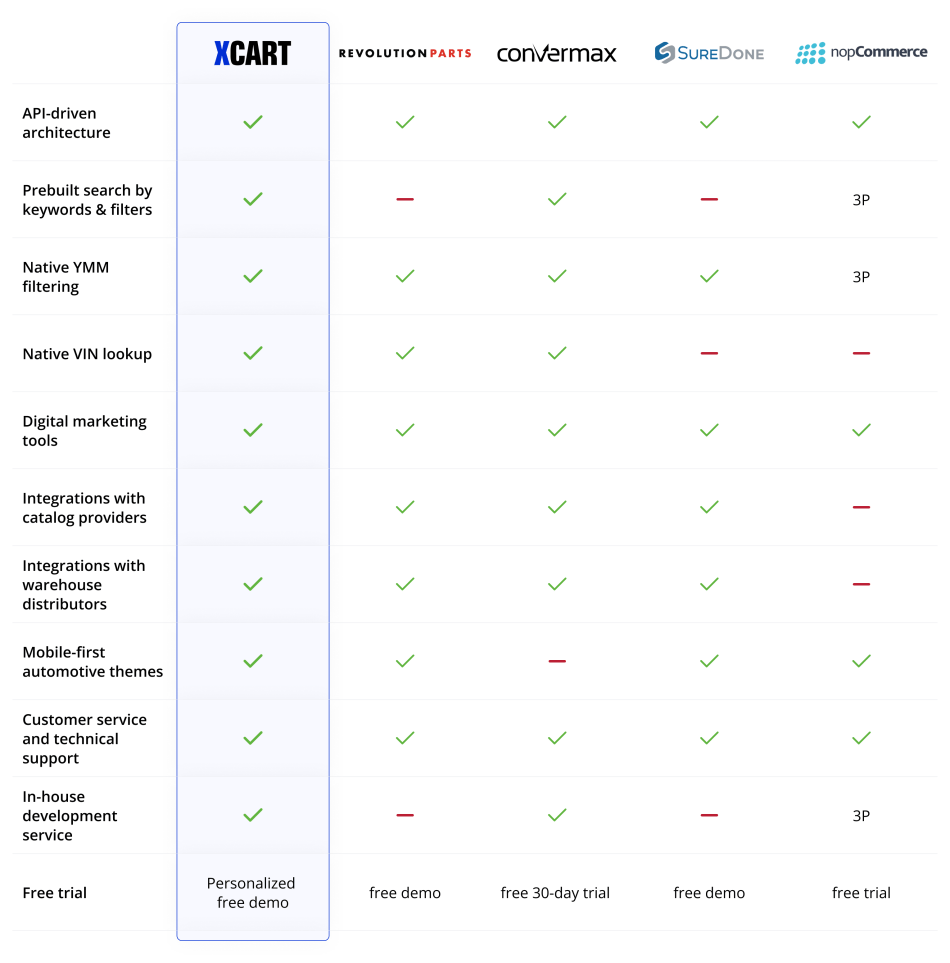
*3P – available via third-party
1. X-Cart
With over 20 years of experience creating online stores, X-Cart has evolved into a comprehensive eCommerce platform for building auto parts websites.
Our focus is split among three solutions that answer the business needs of auto parts dealers, aftermarket manufacturers, and drop shippers. Each solution comes with prebuilt catalog automation tools, seamless integrations, and customer experience features tailored to enhance the convenience of auto parts buyers. X-Cart also has in-house development to assist you with custom integrations and brand visuals.
It should be noted, however, that complex all-inclusive solutions, such as X-Cart Automotive, may have a slower time-to-market compared to Shopify, which is nonetheless compensated by reduced time-to-value.
Here’s what we bring to the table.
Catalog Automation
Automotive parts data is sourced from reliable catalog providers: SEMA Data, ASAP Network, AutoSync, and DCi. Along with seamless integrations with these providers, you also have the flexibility to map categories before uploads, ensuring your catalog is well-structured. Plus, you can set a schedule for automated data imports to start at your preferred time.
Fitment Search
Unlike platforms relying solely on third-party plugins, X-Cart provides native Year/Make/Model filters, VIN lookup with My Garage feature* and enhanced fitment search functionality that considers a variety of additional fitment criteria, including:
- Wheels and Tires: Attributes like bolt size, lug nut size, and offset.
- Brake Pads: Fitment notes to ensure compatibility.
- 4х4 Parts: Details such as bed size and cab style.
* All of these features are available as part of your X-Cart Automotive subscription with no additional costs.
Inventory Management
With X-Cart’s multi-WD functionality, you can source inventory from one or more warehouse distributors simultaneously, thus creating a custom product catalog that you can consolidate, synchronize, and manage from a single place – X-Cart admin panel.
The platform offers ready-made integrations with major distributors like Turn 14 Distribution, Keystone Automotive Operations, Meyer Distributing, Premier Performance, ATD, Wheel Pros, DIX Performance North, and more to come soon!
To ensure data accuracy and consistency, you can set up automated price and stock updates for each integration mentioned above.
Automotive Design and UX
Prioritizing user-centric, niche-focused functionality in X-Cart stores, we’ve designed mobile-first templates explicitly tailored for the automotive industry.
And let’s not forget about the tools developed to strengthen trust, enhance website’s credibility, and provide better shopping experiences. Three features we’d like to highlight are Dealer Locator, Customer Gallery, and Core Charge.
Customer service and technical support: X-Cart provides 6+ hours of guided onboarding calls with a customer success manager and a technical support engineer as part of your Automotive subscription and offers 24/7 customer support for all users.
X-Cart – Everything You Need, All in One
Why settle for a patchwork solution when you can have everything in a single one?
Not sure yet?
2. Shopify Plus
Shopify Plus is a popular eCommerce solution that can also be utilized for establishing auto parts web stores. This platform offers integrations with shipping services, marketing and SEO tools, along with the ability to design mobile responsive websites.
Let’s take a closer look at what Shopify Plus offers to automotive businesses.
- API integrations with third-party software solutions
- Up to 8 million SKUs
- Mobile-friendly automotive design templates
- Customized checkout
- Low-code Shopify Flow app for automating inventory tasks;
- Access to Shopify Plus Partner program for third-party developer, design, and marketing services (available at additional cost)
Shopify offers API integrations with third-party software solutions, such as fitment apps like Convermax, EasySearch, azFitment, and Partly PIM. It also connects to data catalog providers and warehouse distributors through software like SparkShipping and Data-Here-To-There, to name a few.
While adding these third-party plugins can definitely boost the performance of your automotive store, there are a few challenges to consider: the setup can be time-consuming, and there may be high fees involved. In some cases, integrating apps with other tools might cause compatibility issues, resulting in extra costs for ongoing support or more advanced customizations beyond the basic setup.
Another factor to consider is payment processing fees for third-party payment providers. These fees start at 0.15% per transaction and vary depending on the country. Online sellers can avoid the fees by opting for Shopify Payments, but this will limit them to only one payment provider.
One-size-fits-all platforms like Shopify are fast and cheap to set up but lack prebuilt parts-specific features. The high costs of necessary add-ons for automotive eCommerce inevitably sow some doubt about whether Shopify Plus is the best eCommerce platform for auto parts, especially for businesses looking to scale in the long run.
Customer service and technical support: Shopify Plus provides 24/7 customer assistance for authorized users.
3. BigCommerce
BigCommerce is a ‘hosted’ eCommerce platform that allows you to design a visually attractive and responsive online store, complete with features such as inventory management, custom pricing, and product filtering. The drag-and-drop page builder provides an effortless way to select content blocks, columns, and images and position them on your pages as you see fit. BigCommerce also integrates with popular marketing tools to help you promote your web store.
Beyond the essentials, BigCommerce offers search and navigation tools, such as the Year Make Model search for the automotive industry. Similar to Shopify, all these tools are third-party. You can connect your store to PartsLogic, Convermax, PartFinder, Surefit, and others.
Parts data for the catalogs can be imported and structured by integrating with SEMA Data, and orders can be managed and fulfilled via SparkShipping. It looks like BigCommerce doesn’t provide direct integrations to automotive warehouse distributors.
Like any eCommerce platform, BigCommerce has some nuances sellers need to consider. Some users have observed slow page load times, resulting in lower rankings on Google and requiring constant and extensive optimization. Besides, you may face the same risks as with Shopify – costs higher than return on investment. However, each business is unique and has its own needs and budget, so it’s up to you.
Customer service and technical support: BigCommerce customer care team is accessible 24/7 via live chat, phone, and email.
4. Adobe Commerce (ex. Magento)
Magento is a scalable eCommerce platform with multiple integrations, broad customization options, and feature-rich omnichannel functionality. For example, with the multi-store feature, merchants can connect warehouses and physical stores and manage inventories and warehouses regardless of customer location, sales channel, or product type.
You can get parts fitment tools with Adobe Commerce through third-party agencies like Classy Lama. However, Adobe Commerce isn’t particularly focused on the automotive aftermarket e-retail sector, so introducing the necessary industry-specific features and integrations often requires customization.
It is also worth mentioning that Magento is a complex technical solution with a steep learning curve, which makes it challenging for non-tech-savvy users to maintain the platform.
Customer service and technical support: Magento does not offer support for its free edition. Moreover, given the multiple toolkits under the Adobe brand umbrella, users may feel confused about which team to contact when they need expert assistance.
5. Web Shop Manager
Web Shop Manager is a SaaS platform designed specifically for auto parts online businesses. Like X-Cart, it delivers native automotive functionality that goes hand in hand with multiple industry-specific plugins.
You can connect your store to DCi and SEMA Data and source parts data for your product catalogs. Web Shop Manager also offers native Year/Make/Model search functionality and integration with PartsLogic to ensure fitment accuracy. It also provides warehousing features and mobile-responsive design templates and has a dealer locator for manufacturers, among other automotive must-haves.
However, this SaaS solution has limited “D-I-Y” options as it does not provide access to the source code. Therefore, users are limited to “out-of-the-box” integrations, and any custom feature will require a significant investment.
Customer service and technical support: Web Shop Manager offers customer support via email within the following working hours: 7:30 am to 5:00 pm PT and support via phone for emergency cases.
6. NopCommerce
NopCommerce offers all the essential features for a reliable eCommerce platform. With its open-source architecture, it integrates with payment gateways, shipping services, warehouse management, and marketing tools, providing smooth performance for small and mid-sized businesses. However, larger companies with extensive customer bases and product catalogs may face performance issues, which could impact the user experience.
While NopCommerce allows for unlimited customization, it’s important to note that its ASP.NET Core architecture can make adding new features more challenging for developers, due to the steep learning curve involved in customizing the code.
While nopCommerce has a large developer community, offering the potential for custom-built automotive features and integrations. The advantage of tailoring your website with unique functionality is appealing, but the downside is that nopCommerce lacks ready-made, out-of-the-box integrations specifically designed for the automotive industry.
This means you would have to invest in custom development, which can be costly and time-consuming. Additionally, managing and maintaining these custom-built features might require specialized expertise, adding to long-term operational costs
Customer service and technical support: NopCommerce provides technical assistance 24/5 for premium users via internal ticket system.
7. Revolution Parts
Like X-Cart, Revolution Parts (RP) is tailored specifically for the auto parts online retail industry. It supports OEM and aftermarket parts, includes YMM search and VIN lookup, and offers integrations for catalog feeds and warehouse distribution, though the exact integration names are not disclosed.
Parts-specific platforms, like Revolution Parts, typically provide everything you need out of the box, requiring little to no customization. However, if your business wants to implement a unique feature or add something extra, achieving that can be challenging without an in-house development team. We couldn’t find any information suggesting that RP provides custom development services.
Customer service and technical support: RP provides dedicated onboarding and customer support by email and phone. You can also find helpful information in FAQs and their knowledge base.
8. Convermax
This parts fitment search plugin works with Shopify and BigCommerce platforms, offering search functionality based on Year/Make/Model, Wheel & Tire size, and keywords. While the Convermax app doesn’t come with fitment data, it can pull and combine data from various sources through integrations like ASAP Network, CatalogRack by DCi, and Parts Authority.
It also streamlines inventory management and order routing with integrations to SureDone, Data-HereTo-There, FeedStation, SparkShipping, and more.
Although it is a helpful automotive solution for online businesses selling parts, accessories, wheels, and tires, it isn’t a complete automotive website builder. It’s a modular tool that can improve your online store’s operations but doesn’t offer all the core eCommerce features needed to build a fully functional site.
Customer service and technical support: Convermax offers support packages for setup and onboarding, starting at $900 for the initial installation and integration. The cost may be higher if custom development services are required.
9. SureDone
This eCommerce solution can be connected to such platforms as eBay, Amazon, Walmart, BigCommerce, Shopify, Magento, and social media sales channels. It can be used as a multichannel connector that provides product management, listing, inventory sync, and automates order fulfillment.
SureDone features a number of integrations with data providers and suppliers and offers automation tools for inventory and order management.
Some of the most popular automotive integrations offered by SureDone include DCi, Motor State, Parts Unlimited, Turn 14 Distribution, myFitment, and more.
Customer service and technical support: The SureDone customer care team is accessible via live chat, phone, and email.
It’s Up to You
When it comes to choosing the perfect eCommerce solution for auto parts, there’s no universal answer. The right choice often depends on the specific features you need, your business’s niche, and your budget. However, the core essentials remain consistent for most automotive e-tailers.
Here is a quick recap of what it takes to sell auto parts online hassle-free:
- scalable product catalog
- native faceted search functionality and YMM filtering
- VIN lookup with “My Garage” feature
- ensured car parts compatibility and ACES & PIES compliance
- integrations with catalog providers
- automation for catalog data management
- order management with WD integrations
- mobile-first automotive themes
- powerful website design tools (e.g. product visualization)
- digital marketing and SEO tools
- customer-centric features, (ex.Core Charge, Dealer Locator)
- dedicated hosting
- professional 24/7 customer support
- in-house development team
- assisted onboarding as part of your subscription
At X-Cart, we provide all the tools and features mentioned above.
And not just them!
Implementing an all-in-one automotive eCommerce solution can significantly impact a retailer’s online presence, conversion rates, and sales growth. The benefits of utilizing a platform that meets your core business needs range from expanding into new markets and optimizing order fulfillment to enhancing customer experience and improving scalability.
Reach out to us to discuss your project, and we’ll guide you through the X-Cart functionality and tell you more about our platform’s capabilities.
Propel sales with a platform that hits your targets and delivers results, without overspending.
About the author

